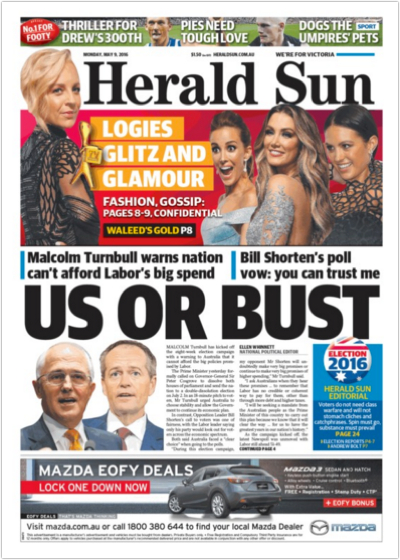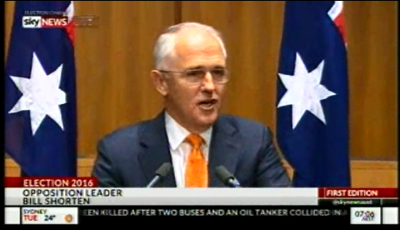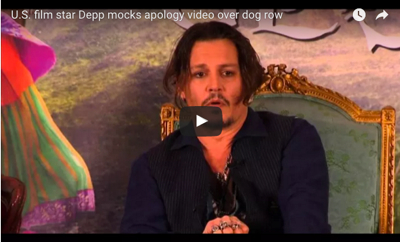Hun snubs Aly? Of all the country’s major papers, only the Herald Sun chose to put the Logies on its front page today (some minor political news got the splash everywhere else). But who’s missing? Eyebrows have been raised over the fact that Gold Logie winner Waleed Aly’s mug is missing from its collage …

The text on the page did direct readers to an article on “Waleed’s Gold” on page 8 — the paper’s report on the Logies led with his victory (there’s a tiny picture of him down the bottom of page 8 too). But why the front-page snub? Did editors think a quartet of pretty women more likely to move copies that Aly? Or were they reluctant to prominently feature a columnist for fierce rival Fairfax?
In the Hun’s defence, it is possible the announcement just came through too late to rejig the front-page graphic. The Gold Logie winner, whom voters decided on in January, wasn’t announced to the public till well after 11pm — well after the first edition deadlines. Aly’s Project co-host Carrie Bickmore, prominently featured on the splash, has won the Gold in the past and was as good a bet as any to take it out again (a caller to Triple M claimed on Friday that she’d take the Gold — the “leak” was off the mark).
Reporting on the Logies has been hard for print papers in recent years. In 2013, The Australian published a piece on Gold Logie winner Asher Keddie before the embargo lifted due to a “production error”. Bauer weekly titles publisher Jayne Ferguson responded with a statement saying that in order to prevent a repeat, “moving forward, all media outlets will find out who all TV Week Logie Award winners are in line with the telecast”. There’s still no embargoed lists of winners given to media outlets, despite lobbying by many of the country’s showbiz reporters. That’s probably why The Age, for example, managed only a report on the frocks in the print edition, but not the winners themselves. — Myriam Robin
Saving ABC Fact Check. The ABC’s Fact Check unit is in the line of fire after a reduction in the tied funding grant used, among other things, to set it up. While the team will keep operating through the election, it’s not clear what will happen afterwards.
On social media, a campaign has started to save the unit. ABC reporter John Barron, who anchors Fact Check’s TV clips, tweeted: “Fact Checking is difficult, nuanced and more expensive than simple opinion.It upsets all sides, so we count on public support.” Cuts to newsrooms, and an increasingly partisan media, mean there’s a need for fact-checking, he added. In comments to Pontyer, Fact Check editor Russell Skelton said that out of 400 checks on factual statements made by politicians and public figures, Fact Check had never been forced to change a verdict.
“It is demoralising for the team to read in rival media about Fact Check being axed,” he is quoted as saying. “The hope remains the reports are wrong. If they are correct, then the hope is management reconsiders.”
The future of Fact Check came up in Senate estimates, but the ABC declined to give definitive answers to senator Nick Xenophon’s queries about what it was planning. “We are reviewing all of the implications of the budget with the news team, and we aim to make some decisions in the next 10 days or so,” new MD Michelle Guthrie said. In further questioning, ABC director of corporate affairs Michael Millett said that while the ABC had received many complaints from politicians about Fact Check, it had not been raised in budget discussions with the government.
Fact Check was one of several new fact-checking operations set up by media outlets in the lead-up to the 2013 election. The other high-profile entry in the genre, Politifact Australia, headed by former SMH editor-in-chief Peter Fray, didn’t last long. Fact-checking outlets, most notably Politifact, are a fairly established part of the American media landscape. — Myriam Robin
In the red corner, in the blue corner. From hope and fear, to too close to call. Today’s papers all gave the federal election key billing …

Kings to paupers. Last week’s third-quarter results filing from 21st Century Fox has again failed to give any reasons for the sudden impairment of a US$160 million investment in a fantasy sports website by the company in mid-2015. That was the biggest share of a US$300 million investment in the sports fantasy company DraftKings. Included in Fox’s group were the Kraft group, which owns the New England Patriots NFL team, and Wellington Management, a huge Boston-based financial group.
Fox invested approximately US$160 million in cash for a minority equity interest in DraftKings, described by Fox as “leading operator of online fantasy games and contests”. But between then and early 2016 something hit the fan, forcing Fox to slash the value of its investment by more than half. That resulting impairment was close to 60% in the space just on seven months.
“Partnering with DraftKings, a clear leader in this field, is a great opportunity for us to capitalize on the growth of daily fantasy sports for the benefit of our viewers,” Fox Sports president and COO Eric Shanks said in a statement issued last July.
DraftKings, which launched in 2012, said at the time it would use the additional funding to continue building out web and mobile products, launch internationally and explore new opportunities for vertical expansion. But US media reports claimed that the quid pro quo for Fox was a reported US$250 million worth of advertising DraftKings committed to spending on Fox TV stations over the next three years. That made it an attractive deal for Fox.
Major sports such as baseball, soccer, ice hockey, Madison Square Garden and several private equity and other investors also have money in DraftKings. — Glenn Dyer
APN shedding Kiwi papers. Shares in regional publisher APN went into a trading halt this morning at the company’s request until Wednesday to allow the company to do a deal involving its NZ print business.
APN has been looking to get rid of its Kiwi newspaper and printing involvement since 2014, but it has, for various reasons, been unable to complete any transaction. “[T]he trading halt is requested pending the release of an announcement concerning a potential material transaction by APN in relation to APN’s New Zealand business, NZME,” APN told the ASX today.
The company already has put its 16 Australian regional dailies on the market with a suggested price of $50 million to $60 million. If a deal is done, it would mean the company is rapidly heading for the day when it will just consist of its Australian and NZ radio interests and associated businesses.
News Corp Australia owns 14.9% of APN’s shares purchased around 75 cents a share. APN shares traded at 63 cents at the close last Friday. — Glenn Dyer
ShorTurnbull. Thanks to an eagle-eyed Crikey tipster for sending this through. There’ll be plenty of time to get it right …

Video of the day. “I would like to apologise for not smuggling my dogs into England, because it would have been a bad thing to do …”








Yet another feather in Waleed Aly’s cap that he failed to appear on the front page of the Herald Sun.
Fantasy sports web sites have claimed to be games of skill but several US states have tried to have them considered as gambling and either prohibited or more highly regulated. There have also been accusations that insiders were getting an advantage in winning the prizes offered. Both are probably reasons for impaired values to the investors.
Well if Fact Check were not such unashamed left wing stooges, they might have a more secure future. Their biggest mistake is that they descend into commentary and opinion, the very thing they claim to be checking. If they just focused on facts, they’d be more credible.
That’s just reality’s well-known left-wing bias.